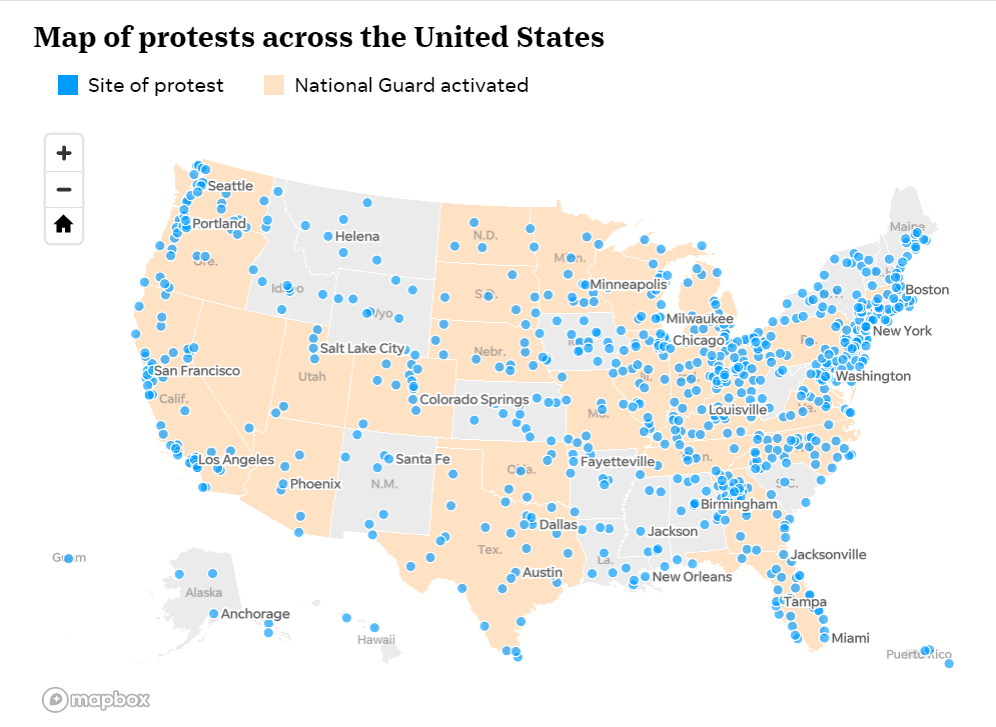|
In a relatively short time, American society has gone from a people trying our best not to spread COVID-19 to a nation in shock over the horrific encounter of Derek Chauvin and George Floyd. Many acknowledge that the situation was brewing beneath the surface for some time, and the scene in Minneapolis simply was the match that ignited what we have now. Regardless of your political views or even your views on systemic racism, the US is not close to a revolution - we are there. Look at some facts. The map below (USA Today) shows cities and towns which have had protests (peaceful or not) and states where the National Guard has been activated. Various places throughout the country are seriously considering dismantling their police forces, with New York City having already diverted funds away from its own NYPD. It does not feel to me like this current crisis will blow over (and I'm not saying it should or shouldn't). Ordinarily, these things, when on this scale, end either with a dictator crushing the rebellion or an overhaul of the way a society is constituted and governed. As a spiritual leader shepherding your congregation during a revolution, here are some reminders and encouragements. There truly has never been a better time to be a pastor, because we have the answers for which so many are genuinely searching.
0 Comments
This post goes a bit deeper than the basic reminder that, as leaders, we need to communicate our expectations and communicate them clearly. You probably have that part down. I find, though, that it is easy to stop there -- and that's not enough. Not only must we communicate what we do want; we must communicate what we don't want.
With the diverse backgrounds of our followers along with different educational attainment, hearing ability, predisposition toward cooperation or not, and so much more, twenty people can hear the exact same presentation and draw at least twenty different conclusions. In fairness, we cannot anticipate every ditch people may stumble into, but investing a few moments to consider this can save you time and headaches down the road. Consider an example. Our church recently added a staff member. We wanted to give that staff member purchasing power, so we asked the bank to generate a credit card for him with "the same information" as the card that I carry as pastor - same billing address, same credit limit, same fact pattern. Months later, we learned that the bank had generated a credit card sharing the credit limit with the card I carry (which is typical procedure we now know). We thought we had clearly communicated that we wanted an additional amount, raising the overall organizational credit limit to accommodate, but the term "same" led all of us into a ditch. Trust me - I could share dozens of other examples, but for a variety of professional reasons, it would be unethical for me to do so. Bottom line: Think through a couple of possible corruptions of your message, and kindly communicate that those corruptions are not what you are after.
An angle that few if any seem to take is to examine the issue from the perspective of overall church unity. It just so happens that I am guiding my church through 1 Corinthians in this modern situational context; so church unity is obviously on the brain. Two questions emerge: (1) Can you have spiritual unity without political unity? and (2) What does preserving spiritual unity look like in such a politically divisive age?
There is a definite time to stand up for what is right - especially when the Gospel itself is at stake. There are other times that God calls us to be peacemakers and to diffuse volatile situations. Thankfully, there is biblical help for approaching these situations. We certainly need God's wisdom and discernment to recognize the best response in each case. In the New Testament, few churches had faced such bitter division as did the Corinthians. Here are a few tips from 1 Corinthians Chapter 1 - Paul's prescription for restoring unity in Corinth that give valuable insight for conflicts we face today.
 In one of those chats where you sit and talk with your wife about your day, my wife and I were discussing a common phenomenon in every church - namely, that people vote with their checkbook, their money. You and I would readily agree that legalism hurts and kills a church. But something that had never before occurred to me was this particular connection between legalism and the church's cash flow and what that connection means for leading a church. |
AuthorPastor Billy Shaw is a full-time pastor, husband, and father with a passion for helping other pastors. Archives
August 2020
Categories
All
|



 RSS Feed
RSS Feed